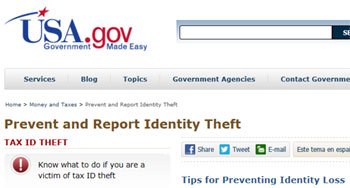 Identity theft continues to be a growing problem for consumers. To help consumers, the fraud experts at USA.gov have published a number of tips to avoid and prevent identity theft.
Identity theft continues to be a growing problem for consumers. To help consumers, the fraud experts at USA.gov have published a number of tips to avoid and prevent identity theft.
When identity thieves steal your personal information to commit fraud, they can damage your credit status and cost you time and money restoring your good name. Here are some tips that you can follow to reduce your risk of becoming a victim of identity theft.
•Don’t carry your Social Security card in your wallet or write it on your checks. Only give out your SSN when absolutely necessary.
•Protect your PIN. Never write a PIN on a credit/debit card or on a slip of paper kept in your wallet.
•Watch out for “shoulder surfers”. Use your free hand to shield the keypad when using pay phones and ATMs.
•Collect mail promptly. Ask the post office to put your mail on hold when you are away from home for more than a day or two.
•Pay attention to your billing cycles. If bills or financial statements are late, contact the sender.
•Keep your receipts. Ask for carbons and incorrect charge slips as well. Promptly compare receipts with account statements. Watch for unauthorized transactions.
•Tear up or shred unwanted receipts, credit offers, account statements, expired cards, etc., to prevent dumpster divers getting your personal information.
•Store personal information in a safe place at home and at work. Don’t leave it lying around.
•Don’t respond to unsolicited requests for personal information in the mail, over the phone or online.
•Install firewalls and virus-detection software on your home computer.
•Check your credit report once a year. Check it more frequently if you suspect someone has gotten access to your account information.
How to Report Identity Theft
Here is what the experts advise you to do if you believe your identity has been stolen: You can download and complete what it known as a ID theft affidavit. All three credit bureaus and many major creditors have agreed to accept the affidavit.
Remember that your wallet contains some of your most important personal items, from hard-earned money to credit cards and driver’s license. For an identity thief, your wallet offers a treasure trove of personal information. If your wallet is lost or stolen: If you suspect or become a victim of identity theft, follow these steps:
•Report it to your financial institution. Call the phone number on your account statement or on the back of your credit or debit card.
•Report the fraud to your local police immediately. Keep a copy of the police report, which will make it easier to prove your case to creditors and retailers.
•Contact the credit-reporting bureaus and ask them to flag your account with a fraud alert, which asks merchants not to grant new credit without your approval.
![Herbal Reference Substances are Key to Everyday Products <!-- AddThis Sharing Buttons above -->
<div class="addthis_toolbox addthis_default_style " addthis:url='http://newstaar.com/herbal-reference-substances-are-key-to-everyday-products/3512112/' >
<a class="addthis_button_facebook_like" fb:like:layout="button_count"></a>
<a class="addthis_button_tweet"></a>
<a class="addthis_button_pinterest_pinit"></a>
<a class="addthis_counter addthis_pill_style"></a>
</div>When it comes to quality control testing and the development of new products, Botanical Reference Materials (BRMs), also known as Herbal References are critically important. To help companies ultimately obtain all-important FDA approval, the Food and Drug Administration provides in its guidance a recommendation that […]<!-- AddThis Sharing Buttons below -->
<div class="addthis_toolbox addthis_default_style addthis_32x32_style" addthis:url='http://newstaar.com/herbal-reference-substances-are-key-to-everyday-products/3512112/' >
<a class="addthis_button_preferred_1"></a>
<a class="addthis_button_preferred_2"></a>
<a class="addthis_button_preferred_3"></a>
<a class="addthis_button_preferred_4"></a>
<a class="addthis_button_compact"></a>
<a class="addthis_counter addthis_bubble_style"></a>
</div>](http://newstaar.com/wp-content/uploads/2021/02/Achillea_millefolium_flowers-100x100.jpg)
![Quality Electrochemical Biosensors are Critical for Medical, Food and Chemical Industry <!-- AddThis Sharing Buttons above -->
<div class="addthis_toolbox addthis_default_style " addthis:url='http://newstaar.com/quality-electrochemical-biosensors-are-critical-for-medical-food-and-chemical-industry/3512086/' >
<a class="addthis_button_facebook_like" fb:like:layout="button_count"></a>
<a class="addthis_button_tweet"></a>
<a class="addthis_button_pinterest_pinit"></a>
<a class="addthis_counter addthis_pill_style"></a>
</div>A number of industries have, at their core, a need to frequent or even continuous analysis of biological media. These include the medical and pharmaceutical fields, biotech firms, and food and chemical companies. To maintain quality standards and develop new products, these industries rely heavily […]<!-- AddThis Sharing Buttons below -->
<div class="addthis_toolbox addthis_default_style addthis_32x32_style" addthis:url='http://newstaar.com/quality-electrochemical-biosensors-are-critical-for-medical-food-and-chemical-industry/3512086/' >
<a class="addthis_button_preferred_1"></a>
<a class="addthis_button_preferred_2"></a>
<a class="addthis_button_preferred_3"></a>
<a class="addthis_button_preferred_4"></a>
<a class="addthis_button_compact"></a>
<a class="addthis_counter addthis_bubble_style"></a>
</div>](http://newstaar.com/wp-content/uploads/2020/10/Electrochemical-Biosensor-100x100.jpg)
![Company Develops Industrial Mixers Well-Suited for both Fragile and Explosive Products <!-- AddThis Sharing Buttons above -->
<div class="addthis_toolbox addthis_default_style " addthis:url='http://newstaar.com/company-develops-industrial-mixers-well-suited-for-both-fragile-and-explosive-products/3512071/' >
<a class="addthis_button_facebook_like" fb:like:layout="button_count"></a>
<a class="addthis_button_tweet"></a>
<a class="addthis_button_pinterest_pinit"></a>
<a class="addthis_counter addthis_pill_style"></a>
</div>Industrial drum mixers are normally applied to blend mixes of varying viscosities such as adhesive slurries or cement. Some of these mixers have the capability of blending mixes of very different particle sizes such as fruit and ice cream, and gravel and cement slurry. The […]<!-- AddThis Sharing Buttons below -->
<div class="addthis_toolbox addthis_default_style addthis_32x32_style" addthis:url='http://newstaar.com/company-develops-industrial-mixers-well-suited-for-both-fragile-and-explosive-products/3512071/' >
<a class="addthis_button_preferred_1"></a>
<a class="addthis_button_preferred_2"></a>
<a class="addthis_button_preferred_3"></a>
<a class="addthis_button_preferred_4"></a>
<a class="addthis_button_compact"></a>
<a class="addthis_counter addthis_bubble_style"></a>
</div>](http://newstaar.com/wp-content/uploads/2020/06/bandeau-sofragir2-100x100.jpg)